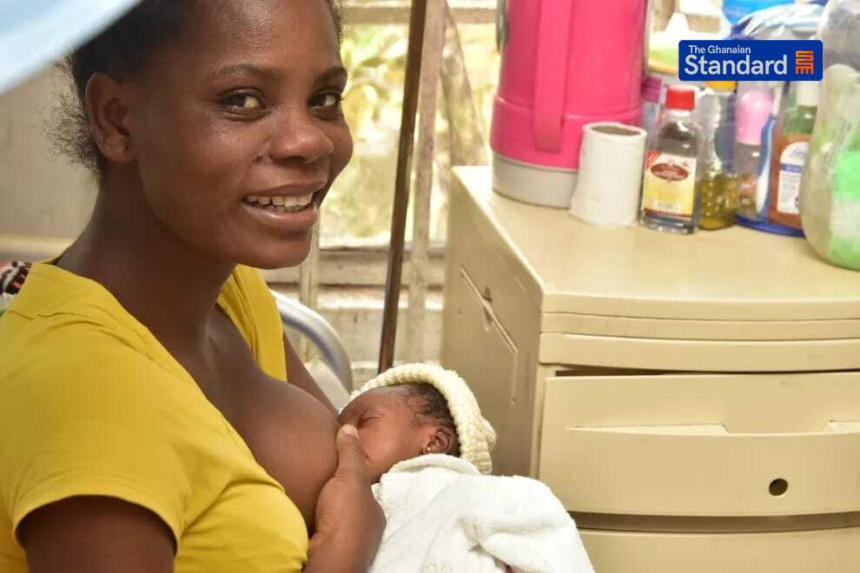The Paediatric Society of Ghana (PSG) has called for stronger stakeholder collaboration and investment to strengthen support systems for lactating mothers to exclusively breastfeed their babies, to guarantee a brighter future for the nation.
Dr Hilda Mantebea Boye, the President of the Paediatric Society of Ghana, said with Exclusive Breastfeeding (EBF), mothers were to give babies only breastmilk few hours after birth until six months, when other complementary feeding could be gradually introduced, as per WHO/ UNICEF requirements.
She cited the enormous benefits of breastmilk for infants, which included optimal nutrition for proper growth, enhanced cognitive development and prevention of upper respiratory tract infections among other childhood illnesses, especially in reducing diarrhoea by 40 per cent.
Also, EBF could prevent cancers (breast and ovarian) in women, reducing maternal mortality rates and neonatal deaths by 50 per cent, lower post-natal depression and mental health challenges, while strengthening parental bonding with children to build emotional and psychological love for family and humanity.
Cognisant of these benefits, the Society, at the virtual launch of this year’s National Breastfeeding Month on the theme: “Strong Support for Strong Start: Empowering Mothers in Ghana to Breastfeed Everywhere,” emphasised the importance of early initiation of breastfeeding and sustaining the practice exclusively for the first six months of life.
Professor Alexander A. Manu, the Executive Director for the Centre for Social Justice, who chaired the function, said it was sad and shocking that from 2002 when the EBF rates for the first six months of life was quoted at 46.6 per cent, 20 years down the line in 2022, the Ghana Demographic and Health Survey (GDHS), revealed that only 47.4 per cent (0.8 per cent) of women or babies zero to five months were exclusively breastfed in the two years to the survey.
He said the median duration of breastfeeding was 2.9 months (three months), which was a touching story for Ghana, because breastmilk was completely free and had saved the lives of about 823,000 children under five years in the past, saying, “It looks like there is more that we can do.”
Prof. Manu said the investments being made during the occasion must leave a lasting legacy for early initiation, sustaining breastfeeding practices, because it had implications not only on child survival and their optimal growth, but also on Ghana’s long-term socio-economic development.
He pleaded with all stakeholders to recount their steps, go back to the basics, considering their efforts as health workers, mothers, partners and interest groups, to secure Ghana’s future, making sure that breastmilk was made available to all children as a civil right.
Madam Fiona Braka, the WHO Country Representative, in her keynote address, said the theme aligned with WHO’s vision and echoed its ongoing “Healthy beginning hope for the Future” campaign, which began on World Health Day in April 2025.
She said globally, increased breastfeeding could prevent over 820,000 child mortality and 20,000 maternal deaths from breast cancer annually, and in Ghana where child malnutrition and neonatal mortality remained a pressing concern, improving breastfeeding rates could be a lifesaving intervention, she added.
Breastfeeding, she noted, was not just a health issue but a development imperative, critical to achieving many of the Sustainable Development Goals (SDGs) of improving nutrition (SDG-2); Preventing child mortality and decreasing the risk of Non-Communicable Diseases (Goal-3), and supporting cognitive development and education as outlined in SDG-4.
Madam Braka said breastmilk offered a superior nutrition value compared to formula because it had vital antibodies and immune factors that protected against infections that could not be replicated by any substitute.
She said Ghana’s Breastfeeding Protection Regulation 2000, LI 1667, prohibited the marketing and distribution of breastmilk substitutes, reflecting a national commitment and urged the strict enforcement of this Regulation in all health facilities across the country, integrating breastfeeding support into the primary healthcare system and Community Health Planning Services.
“WHO and UNICEF recommend initiating breastfeeding within the first hour of birth, EBF for the first six months and continued breastfeeding alongside safe complementary foods up to two years or beyond,” she said.
Madam Braka stated that although the 2022 GDHS highlighted some progress, the trends underscored both the gains made and persistent challenges in sustaining EBF practices, particularly beyond the first few months of life.
She said the gaps identified were not due to lack of awareness but stemmed from a lack of support and empowerment for women to confidently breastfeed everywhere within all spaces, which was “an enabler to ending poverty, promoting economic growth and reducing inequalities.”
She called for critical investment towards empowering lactating mothers with access to information and workplace assistance, including dedicated hygienic breastfeeding rooms with breastmilk storage facilities, intermittent breaks, access to childcare and flexible working arrangements for lactating mothers, urging health facilities to lead the way with improved Baby Friendly Hospital initiatives.
“One common reason why mothers end EBF prematurely is the need for them to resume work without adequate support,” and advised that paid maternity and paternity leaves could significantly increase the likelihood of continued breastfeeding.
She commended the PSG for its tireless advocacy for the health of Ghanaian children, urging its members as breastfeeding ‘Champions,’ to promote related policies within their respective institutions, mentor junior colleagues on lactation to build the confidence of mothers, advocate for workplace reforms, effectively engage families and communities to promote the practice as a shared responsibility.
There were solidarity messages from partners, including Nana Adjoa Awindor, the Development Queenmother of the Efigya-Kwabre District in the Ashanti Region, who called for collective stakeholder action to raise their voices in unity towards intentional advocacy for investment and empowerment for lactating mothers, so the dreamed future of Ghana could be realised.
PSG is a Child Health Awareness and Advocacy non-governmental organisation, which seeks to promote the health and well-being of all children in Ghana.
Paediatric Society of Ghana calls for enhanced support, investment for exclusive breastfeeding

Leave a comment







